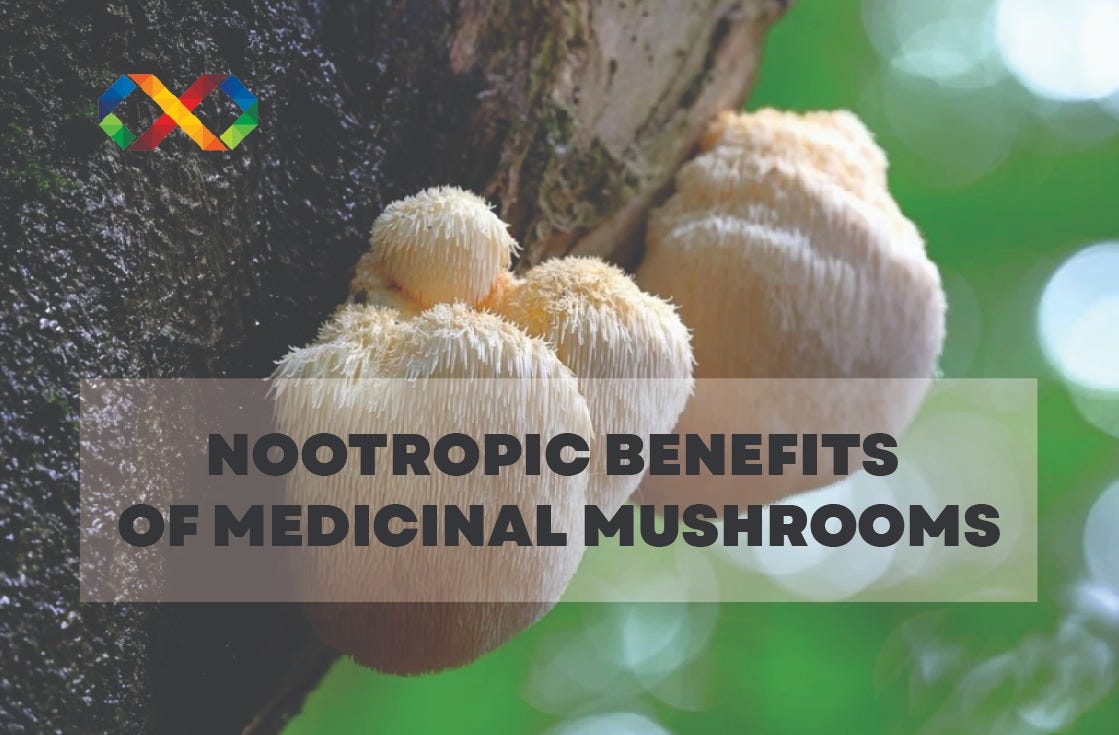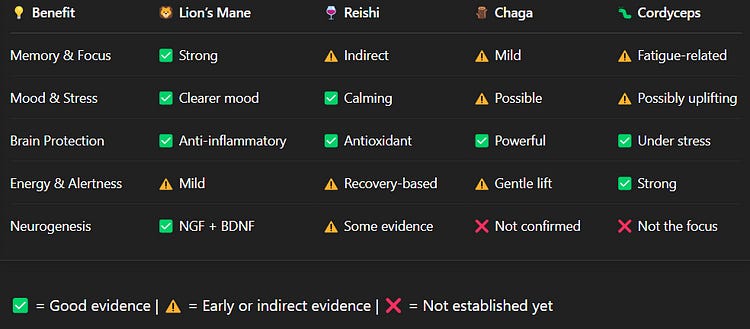Nootropic Benefits of Medicinal Mushrooms: Lion's Mane, Reishi, Chaga, and Cordyceps
Nature’s brain fuel? These four mushrooms have earned a lot of buzz for focus, mood, memory, and stress support. Here’s what the science says—and what’s still up in the air.
So, mushrooms for your brain? Sounds wild — but it’s not new.
Cultures around the world have used mushrooms like Lion’s Mane, Reishi, Chaga, and Cordyceps for generations. Now, modern research is starting to catch up and test what traditional healers already suspected: some of these fungi might actually support brain health.
But not all mushrooms work the same way. One’s more about energy ⚡, another calms the mind 🧘, another protects the brain from stress 🛡️, and one might even help grow new brain cells 🤯.
Here’s the rundown — no fluff, just what’s known, what’s promising, and where we still need better answers.
🦁 Lion’s Mane: The “Mental Clarity” Mushroom
If there’s one mushroom that really stands out in brain research, it’s Lion’s Mane. This fluffy-looking fungus packs compounds (hericenones + erinacines) that may actually help your brain grow new neurons. And yes — these can get past the blood-brain barrier, which is kind of a big deal.
🧪 What we know so far:
In a few small human trials, older adults with mild cognitive decline improved on memory and focus tests after taking 3g/day of Lion’s Mane.
One study found the improvements faded after people stopped taking it. So it’s not a one-and-done kind of deal — you may need to keep taking it to see lasting effects.
A few other trials showed lower anxiety and better sleep, especially in middle-aged and menopausal adults.
Animal studies back it up too: more BDNF, less inflammation, and better brain repair after damage.
💬 Many people report clearer thinking, better focus, and even improved mood. But it’s not a stimulant — more like a brain “tune-up.”
⚠️ Side effects? Pretty mild — maybe some stomach upset or skin itchiness in sensitive folks.
Sources : NIH 2023 | University of Cleveland 2023 | Queensland Brain Institute 2023
🍷 Reishi: The Stress Whisperer
Reishi isn’t really about memory or laser focus. Its strength is stress resilience. Think of it like nervous system support from the ground up.
Used for centuries as a calming adaptogen, it helps the body balance stress hormones (especially cortisol) and improves sleep quality. That alone can sharpen your mind — because let’s be honest, everything works better when you’re rested and not frazzled.
🧪 What the research shows:
In people with chronic fatigue and anxiety, Reishi lowered stress and boosted well-being.
Breast cancer survivors taking Reishi for a month reported less fatigue, anxiety, and depression.
Animal studies found Reishi protects the brain from oxidative stress and may help grow new neurons.
💭 It’s not a fast-acting “brain pill,” but over time, Reishi may help you feel calmer, think more clearly, and avoid burnout.
⚠️ Heads-up: It can interact with blood thinners or immune meds. And some people get dry mouth or dizziness. Nothing major, but still worth watching.
🪵 Chaga: The Oxidative Stress Shield
Chaga looks like burnt charcoal on the outside but is full of antioxidant gold inside. It’s less flashy than Lion’s Mane or Cordyceps, but don’t count it out.
Where Chaga shines is in fighting oxidative stress and inflammation — two sneaky things that mess with memory, mood, and long-term brain health.
🧪 What science is finding:
In mice with induced memory problems, Chaga improved performance in learning tasks (by protecting acetylcholine, a key brain chemical).
In older rats, it reduced Alzheimer’s-like brain inflammation and plaque buildup.
It even protected lab-grown brain cells from amyloid toxins.
🌿 In real life, people often use Chaga tea for gentle energy and immune support. The cognitive benefits might be subtle, but over time, lowering brain inflammation could mean sharper thinking and better mood.
⚠️ Note: Chaga is high in oxalates, so chugging too much (especially in extract form) might not be great for your kidneys. Always go for quality, and don’t overdo it.
🐛 Cordyceps: The Stamina & Focus Booster
Cordyceps is famous for energy. Athletes use it. Mountain climbers swear by it. And it might help your brain, too — especially when you’re running on fumes.
What makes Cordyceps unique is its ability to increase ATP (your cells’ energy fuel) and help your body use oxygen more efficiently. So while it’s not a classic “brain mushroom,” it may help with mental endurance when you’re exhausted.
🧪 Here’s what we’ve seen:
In sleep-deprived mice, cordycepin (a compound in Cordyceps) reversed brain fog and boosted memory.
It also balanced neurotransmitters like dopamine and glutamate — key players in mental energy and motivation.
Some evidence suggests it reduces inflammation in the brain and helps protect neurons from stress.
💬 People who use Cordyceps often describe it as a “clean” energy — no jitters, just steady focus.
⚠️ It’s generally safe, but it may lower blood sugar and affect the immune system. If you’re on diabetes meds or immunosuppressants, talk to your doc first.
🔍 TL;DR: Which Mushroom Does What?
⚠️ One Big Caveat…
These mushrooms aren’t magic pills. Most studies are still early-stage — either in animals or small human trials. That means results are promising, not guaranteed.
If you’re expecting instant brainpower or a cure for memory loss, this isn’t it. What they can offer (at least for now) is subtle support — less stress, better sleep, more stamina, or a clearer headspace over time.
Also: check for medication interactions, and always go with reputable brands. Quality matters a lot with mushroom supplements.
🌱 Final Take
Nature’s brain stack? Maybe.
Lion’s Mane is the go-to for memory and mental clarity. Reishi brings the calm. Chaga holds the antioxidant line. And Cordyceps? That’s your energy ally when life’s dragging.
Used smartly — with realistic expectations — they can be great additions to your brain health toolkit.
Just remember: no mushroom replaces sleep, good food, movement, or meaningful downtime. But these four might give your brain a little edge — or at least protect it while you go out and live your life.
🍄🧠




